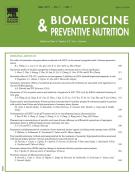Breast cancer status in India: An overview - 15/06/13
 , Nityanand B. Bolshette b, Vinayak S. Jamdade a, Nitin A. Mundhe a, Krishan K. Thakur b, Kandrapa K. Saikia d, Mangala Lahkar a, c
, Nityanand B. Bolshette b, Vinayak S. Jamdade a, Nitin A. Mundhe a, Krishan K. Thakur b, Kandrapa K. Saikia d, Mangala Lahkar a, cAbstract |
Breast cancer is a complex disease that results from a multistage process involving the deregulation of a number of different signaling cascades. Breast cancer is the second most common cancer among women in India and accounts for 7% of global burden of breast cancer and one-fifth of all cancers among women in India. Over 90,000 new cancer cases are estimated to occur this year and over 50,000 women are estimated to die of it annually in India. This continuing magnitude of the breast cancer problem with respect to incidence, morbidity and mortality requires further studies involving novel approach to prevent this disease. Among the prime factors fuelling the disease in the country, especially among urban women, are fast-paced lives and delayed reproductive activity. With breast cancer growing at alarming rates among urban women in India, lifestyle changes such as delayed reproductive activity, prolonged reproductive period playing hormonal havoc and lack of physical work are being cited as key factors. Breast cancer is a multifactorial and hence multitargeted disease in which nearly all targets are directly or indirectly interdependent on each other, due to this breast cancer considered as one of the most complex disease. Prognosis and survival rate of breast cancer greatly depends upon, which and how many targets get activated. High hormone level, diet, obesity and lifestyle are considered to be major risk factors. So many studies have revealed that MAPK, PI3P/PI3K/AKT pathways are most important targets for breast cancer treatment, because these are directly or indirectly activated by nearly all other pathways. Different approaches are there to treat breast cancer, but the most preferred one is chemotherapy, which is mostly supplemented by other therapies like surgery, radiation and hormonal therapy.
Le texte complet de cet article est disponible en PDF.Keywords : Breast cancer, Epidemiology, Mechanism, Targets
Plan
Vol 3 - N° 2
P. 177-183 - avril 2013 Retour au numéroBienvenue sur EM-consulte, la référence des professionnels de santé.
L’accès au texte intégral de cet article nécessite un abonnement.
Déjà abonné à cette revue ?

